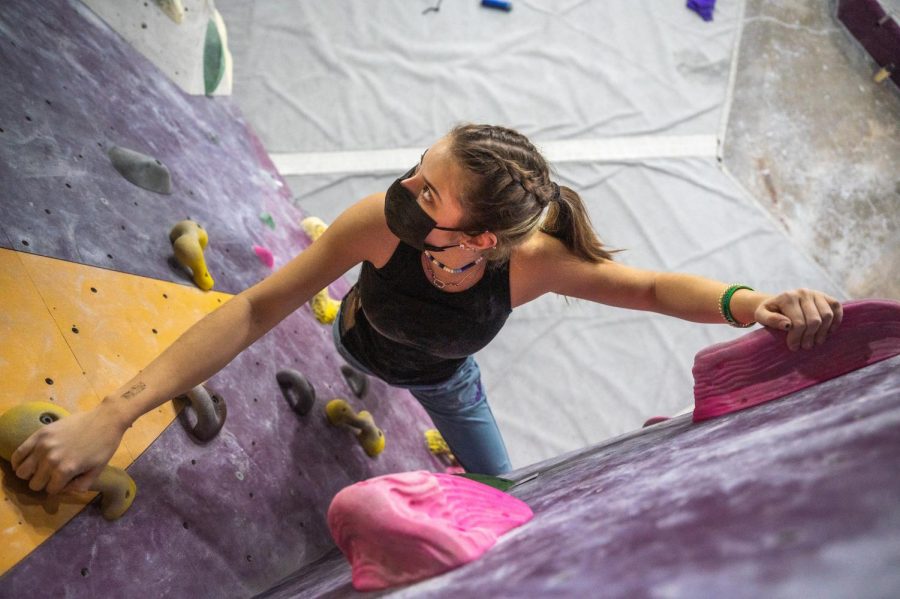Rock stars: Through rock climbing, students reach new heights
December 17, 2021
Holding on with white knuckles, the climber’s chalky hands grip the peg. She hangs upside-down, straddling two pegs, preparing the strenuous lunge to the last one. If she makes a single false move, she would have to start scaling the wall once again. Only the top of the wall is in her mind.
She jumps. Catching herself with an outstretched hand, she holds on as tightly as possible.
From below, applause erupts. Her teammates’ cheers echo the loudest. After numerous unsuccessful attempts, the route up the wall is now complete. This high-stakes situation is one rock climbers at U-High are accustomed to through their years of competition.
These student climbers have earned high achievements in competitions throughout the country, helping build a close-knit community that they recommend to others.
The group, consisting of sophomores through seniors, practices together at the First Ascent gym on Block 37 three days a week. Numerous other accessible locations for weekly climbing are available around the city, such as Brooklyn Boulders in Lincoln Park and the West Loop, and Movement climbing gym, also in Lincoln Park.
Eli Strahilevitz, a sophomore who has been climbing for 10 years, suggests the sport to anyone because of its mental and physical benefits.
“I’d definitely recommend it,” Eli said. “In my opinion it’s very fun, and it’s also good exercise. I use it also as stress relief sometimes.”
Additionally, sophomore Jackson Skelly, who has also been climbing for 10 years, said rock climbing may seem intimidating but accommodates people at any skill level.
“It sounds like a really daunting sport, really intense and physical, but it’s really not,” Jackson said. “There are a lot of options for people who aren’t as strong, who aren’t as athletic. It actually is fairly accessible.”
Aside from these benefits, the group also practices rock climbing to prepare themselves for numerous competitions. According to Eli, U-High climbers have made it to national competitions and the team typically wins the six-state regional, which attracts competitors throughout the Midwest. One teammate from a different school even holds the speed-climbing record.
Over the past two years, the coronavirus pandemic slowed the rate and scale of competitions. Some competitions required climbers to record themselves scaling a specific route, but some in-person climbing has resumed recently.
Sophie Volchenboum, a senior who has been climbing for eight years, says each member competes individually but still represents their gym. In competitions, rock climbers focus on making as much progress as possible on the route and hopefully reaching the top.
“Competitions are about how high you can get on a route, and when you’re climbing in a gym your goal is to finish the route however you can,” Sophie said. “You don’t get any style points here, you’re not timed. You just want to get to the top.”
Although physical strength and athleticism are needed In order to achieve this, climbers also build a mental approach in how to scale the wall, she said.
“You get really good at reading routes, which means anticipating what you’re going to have to do before you get on the wall,” Sophie said.
Talia Lasko, a junior who has been climbing for over three years, believes that one of the most important aspects of rock climbing has been the close group of people partaking in the sport.
“I think it’s like a really great community,” Talia said. “I think that everyone builds each other [up] and, at least at my gym, the team is very close and good friends.”




























































